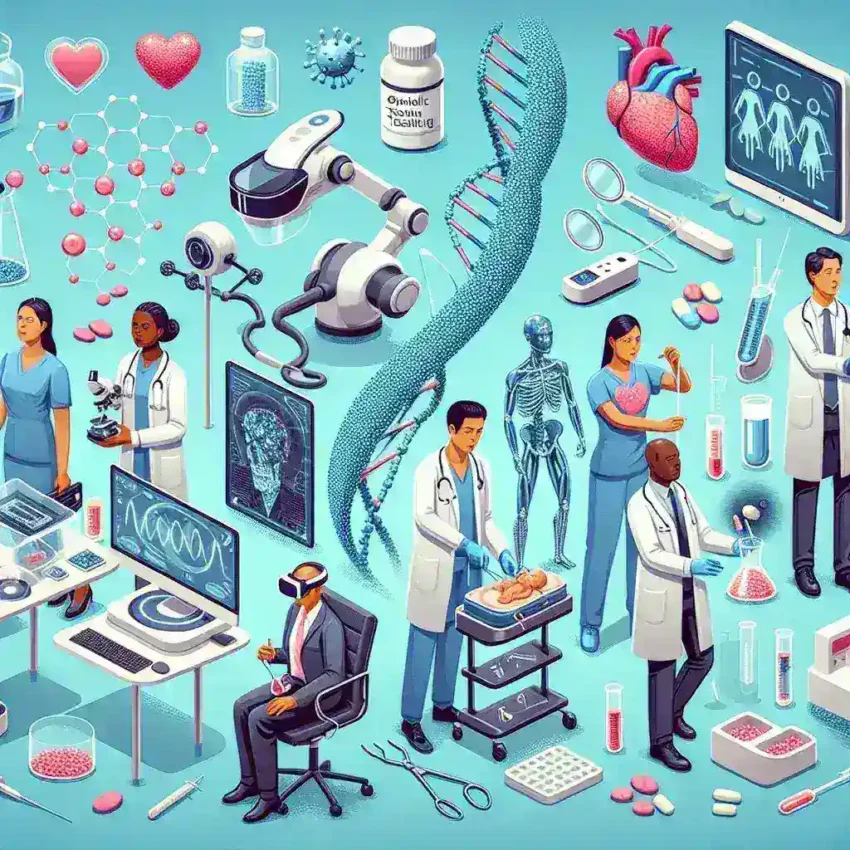Introduction
Personalized medicine is reshaping the landscape of healthcare, offering treatments and prevention strategies tailored to individual genetic, environmental, and lifestyle factors. With the advent of emerging technologies, the potential for personalized medicine has reached unprecedented heights, promising improved patient outcomes and a more efficient healthcare system. This article delves into how these technologies are enabling personalized medicine and what the future holds.
The Evolution of Personalized Medicine
Historically, the concept of personalized medicine dates back to ancient practices where physicians could alter treatments based on observable characteristics of patients. However, it wasn’t until the completion of the Human Genome Project in 2003 that personalized medicine began to emerge as a formalized approach to healthcare. The project mapped the entire human genome, paving the way for understanding how genetics influence health, disease, and response to medications.
Key Milestones
- 2000-2003: The Human Genome Project is completed, marking a watershed moment in genetics.
- 2005: The term ‘pharmacogenomics’ gains traction as researchers explore how genes affect drug response.
- 2010s: Advances in DNA sequencing technology lead to reduced costs and faster processing times.
- 2020: The COVID-19 pandemic accelerates the adoption of telemedicine and digital health solutions.
Emerging Technologies Driving Personalized Medicine
1. Genomics and Bioinformatics
Genomic sequencing is at the heart of personalized medicine. By analyzing a patient’s genetic makeup, healthcare providers can identify specific mutations that may influence disease risk and treatment efficacy. Bioinformatics tools process and interpret vast amounts of genomic data, allowing researchers and clinicians to develop customized treatment plans.
2. Artificial Intelligence (AI)
AI is revolutionizing personalized medicine by enhancing data analysis and predictive modeling. Machine learning algorithms can analyze patient data to identify patterns that may predict responses to treatments. For example, AI-driven tools can assist oncologists in selecting the most effective therapies based on a patient’s unique tumor genetic profile.
3. Wearable Technology
Wearable devices enable continuous health monitoring, providing real-time data on vital signs, activity levels, and other health metrics. This data can be integrated into personalized treatment plans, allowing for timely interventions and adjustments based on individual patient needs.
4. Telemedicine
The rise of telemedicine has made personalized care more accessible. Patients can consult with specialists remotely, ensuring that they receive tailored advice and treatment without geographical constraints. This is particularly beneficial for individuals living in remote areas or those with mobility challenges.
5. Big Data Analytics
Big data analytics allows for the integration of diverse data sources, including electronic health records (EHRs), clinical trials, and patient registries. By analyzing this data, healthcare providers can identify trends and correlations that inform personalized treatment strategies.
Advantages of Personalized Medicine
The shift towards personalized medicine is not just innovative; it also brings tangible benefits:
- Improved Efficacy: Treatments tailored to the individual’s genetic profile can lead to better therapeutic outcomes.
- Reduced Side Effects: By matching patients with the most suitable medications, personalized medicine can minimize adverse drug reactions.
- Early Detection: Genetic testing can identify individuals at risk for certain diseases, allowing for preventive measures before symptoms arise.
- Cost-Effectiveness: Targeted therapies can reduce waste by ensuring patients receive treatments that are more likely to work for them, ultimately lowering healthcare costs.
Challenges in Implementing Personalized Medicine
Despite the significant potential, personalized medicine faces several challenges:
- High Costs: Genomic testing and targeted therapies can be expensive, limiting accessibility for some patients.
- Data Privacy Concerns: The collection and storage of sensitive genetic information raise ethical questions regarding privacy and data security.
- Regulatory Hurdles: The evolving nature of personalized medicine presents challenges for regulatory bodies in approving new therapies and ensuring their safety and efficacy.
- Lack of Standardization: Variability in testing methods and treatment protocols can lead to inconsistencies in care.
Future Predictions for Personalized Medicine
The future of personalized medicine looks promising, with several trends expected to shape its evolution:
- Integration of Multi-Omics: Future advancements may see the integration of genomics, proteomics, metabolomics, and other omics layers to develop a holistic understanding of health.
- Increased Use of AI: AI will continue to play a critical role in analyzing complex data and facilitating precision medicine approaches.
- Expansion of Preventive Care: A shift towards preventive medicine will see more emphasis on lifestyle interventions informed by genetic predispositions.
- Collaborative Healthcare Models: Personalized medicine will thrive on interdisciplinary collaborations between geneticists, oncologists, pharmacists, and data scientists.
Cultural Relevance of Personalized Medicine
As healthcare systems worldwide strive to become more patient-centered, personalized medicine resonates with the growing demand for individualized care. Culturally, the approach acknowledges the unique backgrounds of patients, including their genetic diversity, beliefs, and values. By embracing this cultural relevance, personalized medicine can bridge gaps in healthcare disparities and promote equity.
Conclusion
Personalized medicine, powered by emerging technologies, holds the promise of transforming healthcare into a more tailored and effective system. As we continue to innovate and address the challenges posed by implementation, the vision of truly personalized care is becoming a reality. By harnessing the power of genomics, AI, wearable technology, and big data, we can look forward to a future where medicine is not just a one-size-fits-all approach but a bespoke journey towards health and wellness.

